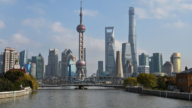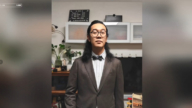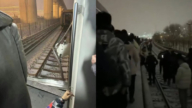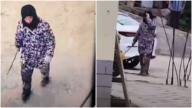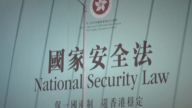【新唐人2013年08月10日訊】就在中共當局以開除上海三名嫖娼法官來平息公眾憤怒的同時,8月7號,上海巿人大常委的夫人楊曉蓉實名舉報上海市人大信訪主任鄔立群,索要及收受她的財物以「搞定」法官。另外也是最近幾天,原太子奶集團董事長李途純實名舉報,現任湖南省交通廳副廳長肖文偉製造了「太子奶冤案」。此前,還有大陸記者實名舉報中共前發改委副主任劉鐵男和「華潤集團」董事長宋林。儘管現在不僅僅是普通民眾,連中共體制內人士也紛紛加入網絡實名舉報大潮,令貪官聞網色變,官場人人自危。不過,大陸學者認為,這種擴大到各階層的舉報潮,雖然是一種進步,但同時也是一種悲哀。請看學者的分析。
在這場網絡實名舉報的大潮中,值得指出的是,上海三名法官被撂倒,也是因為嫖娼錄像在網絡上曝光之後才推動上海當局採取行動。此前,爆料人倪培國因為案件判決不公曾赴京上訪,卻石沉大海。這迫使他採取「基督山伯爵式的復仇」來扳倒他眼中的枉法官員。
北京註冊會計師杜延林指出,在整個社會監督機制不健全的情況下,靠政府內部所謂的反貪機構和檢察機關,來發現貪污腐敗的犯罪,幾乎是不可能。所以最近的一些官員腐敗醜聞,幾乎都是網民在網上先爆料,然後檢察機關才不得不介入的。他認為,在一個沒有完整的監督機制的國家裏,靠網絡舉報,這既是一種進步,也是一種悲哀。
北京註冊會計師杜延林:「所謂進步,就是互聯網時代的到來,使得獨裁政權已經很難用傳統的方式進行統治了。他們的醜聞或腐敗行為隨時都會暴露在互聯網上。所以也會對他們的行為形成一種制約。但是同時我們也會發現,當這種舉報日益頻繁的時候,官方也會出臺一些互聯網的監控措施,來對網民進行限制或打擊報復。」
據大陸媒體報導,2012年下半年以來,頻發的「房叔」「房嬸」事件令住房信息系統成為一些官員的夢魘。一些地方政府加緊出臺了房屋信息查詢規範,這些規範對輸入人名查詢名下有多少套房的「以人查房」方式作出專門約束。
杜延林:「所謂悲哀,就是官方並沒有順勢而為,利用這種監督去完善它的監督機制,而是用各種方式來限制公民的監督行為。所以,一面是民間的互聯網的壓力,一面是官方的保守的後退,所以本身的進步中也會暴露了官方所謂反腐敗的虛偽。」
北京外國語大學新聞學副教授喬木認為,雖然網絡舉報影響很大,但是最終的結果還是取決於官方的態度。
北京外國語大學新聞學副教授喬木:「你會注意到在這麼多高官舉報當中,可能唯一一個是劉鐵男有了結果,但是大量的舉報其實是沒有結果的。而且會被刪貼,主流媒體不會報導這個事。比如之前記者王文志舉報宋林,包括最近李建軍到香港,這樣的事帖子被刪,也沒有甚麼進展。」
面對網絡舉報的潮流和民眾監督的強大壓力,喬木認為,政府是比較矛盾的,當局是在有選擇的查處,而且盡量做一些切割。喬木分析,當局可能盡量把個案跟政治、制度和更高層的領導切割開來,從薄熙來,王立軍,谷開來等一系列案件來看,都是如此。
喬木:「比如說最近上海爆出的錄像舉報法官集體嫖娼這個事,處理的非常及時,也非常到位,但是也就把這個事件本身,這幾個當事人處理了。那相關的律師,以及整個法官之前的判決是否不公?可能也就到此了。」
喬木指出,由於互聯網的存在,以及公民意識的覺醒,使得當局不得不面臨強大的壓力,所以未來中國會發生一些政治上的改變。從中共官員貪腐的普遍性來看,他相信網絡實名舉報會越來越多,直至帶來一個根本性的變化,從具體的個體的監督轉變成全面監督,比如實現新聞自由和司法獨立。
採訪編輯/秦雪 後製/鍾元
A Nationwide Whistle-Blowing Tide against Communist Officials
Shanghai´s three court judges have been sacked for
their involvement with prostitution to appease public anger.
On 7th August, the wife of a Standing Committee member
for Shanghai Municipal National People’s Congress, blew the
whistle on the director of the Shanghai Petitioning Office.
The official was accused of asking for her money to
bribe some specific court judges.
In recently days, ex-president of China Prince Milk Group
blew the whistle on Xiao Wenwei, deputy director of the
Transportation Department of Hunan Province.
Earlier on, media reporters blew the whistle on
Liu Tienan, ex-energy chief, and
Song Lin, chairman of China Resources Holdings Co.
So far, besides ordinary citizens, many people of
the privileged group of the Chinese Communist Party (CCP)
have joined the ranks of whistle-blowing on the internet.
This has made the CCP officialdom feel insecure.
A China scholar points out that the phenomena is
a kind of progress, and a tragedy, too.
Let´s see what the scholar will tell us.
China is seeing a tide of real-name whistle-blowing
on the internet.
Recent internet whistle-blowing, with whore videos,
have successfully struck to take down three Shanghai judges.
Prior to this, the whistleblower had been ignored when
petitioning to seek justice from CCP authorities in Beijing.
This forced him to take revenge to remove
the officials who broke the law.
Beijing CPA, Du Yanlin, says that when a society
lacks an effective oversight mechanism,
it’s almost impossible to discover crimes including
corruption by relying on the anti-corruption
governmental agencies or by procurator organs.
That´s why recently, some corruption and scandals
were all exposed firstly on the internet by netizens.
After that, the procuratorial organs were forced
to take over the cases.
Du Yanlin thinks it is a sort of progress,
and a sort of tragedy as well.
Du Yanlin: “I mean progress is that, in the internet era,
the dictatorial regime cannot maintain their rule in traditional ways.
Their scandals or corruption can be exposed
at any time on the internet.
It is a form of constraint against their wanton acts.
But we´ve also seen that when such whist-blowing
is growing, the authorities have increased surveillances
on the internet to take rein or retaliation."
China´s media reports that since the second half of 2012,
the CCP officials have been frequently exposed for
their owning multiple-properties.
Thus, some local authorities have formulated rules
on housing information queries.
Searching for property by name
has some restrictions applied.
Du Yanlin: “The tragedy I just referred to is that
the authorities haven´t adapted to the trend to
improve its monitoring mechanism.
Rather, they have used a variety of ways to
prevent a public watchdog.
So on the one hand, there´s pressure from netizens on
the other, the authorities are conservatively drawing back.
In this sense, the progress itself actually mirrors
the authorities´ hypocrisy of the alleged anti-corruption."
Qiao Mu, associate professor in journalism,
Beijing Foreign Studies University, comments.
He thinks that internet whistle-blowing has
produced a great influence.
However, the end result will still depend on
the authorities´ attitude.
Qiao Mu: “You can see that among so much
whistle-blowing on high-ranking officials,
there´s only one about Liu Tienan having results.
A large number of whistle-blowing is fruitless,
which can be removed at any time by censors.
The mainstream media in China won´t report on such issues.
For example, former journalist Wang Wenzhi had
his posts removed for his whistle-blowing on Song Lin.
Journalist Li Jianjun recently went to Hong Kong
to whistle-blow against China Resources management.
The posts about this news were all removed,
and there were no further updates."
Under huge pressure from internet whistle-blowing
and the growing public watchdog,
the CCP authorities are rather contradictory, says Qiao Mu.
He analyzes that the CCP authorities are now
making selective investigations and punishments.
The CCP is trying to cut ties of some individual cases
with its political system and high-ranking leaders.
Cases of Bo Xilai, of Wang Lijun, and of Gu Kailai have
all proven this.
Qiao Mu: “An example is the recent whistle-blowing
against Shanghai court judges´ prostitution.
The case was handled very timely and properly.
The relevant parties have all been punished.
But what about the concerned lawyers?
Were the judges´ previous verdicts just and fair?
I don´t think these can be traced back."
Qiao Mu indicates that internet and civic awakening
has given rise to a great pressure for the CCP authorities.
He believes that this may bring some political changes
to China in the near future.
The CCP officials´ corruption is common nationwide.
Qiao Mu estimates that real-name whistle-blowing will
keep on growing, until the arrival of a fundamental change.
That is, a transform from individual citizen watchdog
into an overall public watchdog.
On that day we will see the freedom of the press and
an independent judiciary in China, says Qiao Mu.


